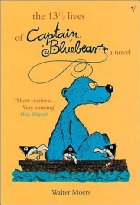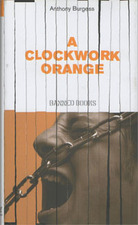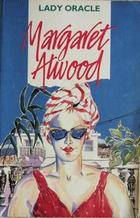Review: ‘A Lion Among Men’ by Gregory Maguire
Author: Gregory Maguire
Published: Headline Review, 2009, pp. 426
Genre: Fantasy
Blurb: While civil war looms in Oz, an oracle named Yackles prepares for death. Before her final hour, the Cowardly Lion arrives searching for information about Elphaba, the Wicked Witch of the West. Yackles, who hovered on the sidelines of Elphaba’s life, demands some answers of her own.
Brrr surrenders his story: abandoned as a cub, his earliest memories are gluey hazes, and his path from infancy in the Great Gilikin Forest is no Yellow Brick Road. In the wake of laws that oppress talking Animals, he avoids a jail sentence by serving the war-mongering Emperor of Oz.
Where, when and why: I was given this book as a present last Christmas, so I thought it was about time I got round to reading it while I could still vaguely remember the other two books in the trilogy. It also counts towards my Books Off the Shelf Challenge and is book 18/50.
What I thought: This book is the third and final installment in Gregory Maguire’s Wicked trilogy and I have to say I’m rather relieved. I found Wicked odd, but enjoyed it because of the inventive reimagining of the land of Oz and its characters. Son of a Witch was even more peculiar and only interesting in the light it shed on events in the previous book. With A Lion Among Men I couldn’t help but feel that Maguire had deliberately left loose ends in book two purely so that he could write a trilogy, as the book was forced and at times even painful to read.
A Lion Among Men tells the stories of the Lion and Yackle, neither of which, unfortunately, are particularly interesting or relevant because they are so far removed from the original tale of Dorothy and Elphaba. This tenuous link is the only thing which makes this book bearable: if it were about different characters then there would be nothing to recommend this story at all. The two narratives are haphazard in their organisation, unbalanced in their delivery and unrelated to one another, so don’t really interweave very well. Plot twists which were presumably meant to be surprising came across as irrelevant and were dismissed rather than developed. It felt as though Maguire was being perverse for the sake of it a lot of the time and that does not a good novel make.
Ignoring the confused plot and annoying characters, there were moments of this book which I quite enjoyed. I liked the importance of books in this novel and how they were described:
Books could seem to unleash all the hallelujahs of hell…but even books that did not detonate into history, as the Grimmerie had, could still whisper their private secrets. (p. 19)
He didn’t remember that a mere book might reek of sex, possibility, fecundity. Yet a book has a ripe furrow and a yielding spine, he thought, and the nuances to be teased from its pages are nearly infinite in their variety and coquettish appeal. And what new life can emerge from a book. Any book, maybe. (p. 399)
The descriptions are evocative, and seem peculiarly appropriate given how I spent my time at university learning that all books are essentially about sex. Either that or my lecturers were particularly obsessed.
I also enjoyed some of the humour. Some of it fell very flat, but there were a few gems which stood out. I particularly liked the moment when the Lion asks the Dwarf if he knows what will happen next, to which the Dwarf responds:
Of course I don’t know… I’m the servant here. When did you ever know a dwarf to be in charge? (p. 382)
This is the sort of mockery of fairytale and fantasy stereotypes which made Wicked work, but which has been sadly lacking from both of the subsequent installments. Such a shame.
Where this book goes: The completist in me demands that I keep this book as I have the rest of the trilogy. If I ever run out of shelf space the whole set are in dire danger of going though.
Tea talk: Thanks to the delightful August weather (apparently nobody told the weather that it’s meant to be summer), I’ve had a rotten cold for the past few days. I’ve been combatting this with lots of delicious Lady Grey tea, laced liberally with honey.
Review: ‘The 13 1/2 Lives of Captain Bluebear’ by Walter Moers
Title: The 13 1/2 Lives of Captain Bluebear – Being the biography of a seagoing bear, with numerous illustrations and excerpts from the ‘Encyclopaedia of the Marvels, Life Forms and Other Phenomena of Zamonia and its Environs’ by Professor Abdullah Nightingale
Author: Walter Moers, trans. John Brownjohn
Published: Vintage, 2001, pp. 704
Genre: Fantasy
Blurb: Some Minipirates find a baby bear with blue fur inside a walnut shell floating on the ocean toward a giant whirlpool. They rescue him and teach him about knots and waves, and that a good white lie is often considerably more exciting than the truth. Then, when he outgrows their ship to such an extent that he is in danger of sinking it, they abandon him on an island with a bottle of seaweed juice and a loaf of seaweed bread. Thus Bluebear comes to the end of his first life and embarks on his second. By the end of the book, he has expended exactly half of his 27 lives. Again and again, Moers confounds our expectations as the narrative twists and turns, travels backwards and forwards in time… Part science fiction, part fairy tale, part myth, part epic, this book is a satire on all these genres and so constantly satirises itself.
When, where and why: I must have bought this book a long time ago as I remember buying it from Waterstones, and I’ve not bought a full priced book for years. I picked it up then because it looked bizarre and entertaining. Now, because I do most of my reading while travelling to and from work, I mentally divide my books into ‘books small enough to read on the train’ and ‘books which will result in wrist injury and/or braining of other passengers if attempted to read on the train’. This is a big book and so has been my at home read for the past month or so. It’s also book 17/50 for my Books Off the Shelf Challenge.
What I thought: If you can imagine The Odyssey crossed with Doctor Who then you’ll have a pretty good idea of what this book is like. The story of Bluebear and his various lives travelling around the bizarre continent of Zamonia read like a strange hybrid of epic Greek literature with its twists and turns, deus ex machina and meandering journeys, and a series of Doctor Who episodes with their wacky logic, improbable but enjoyable situations and strange cast of characters. It was unusual, unexpected and I loved it.
What makes the world of Zamonia so interesting and this book so absorbing is the huge amount of detail that Walter Moers has put into it. All of the characters and locations are well fleshed out and immersive to read about. This is largely due to the constant interjections into the text from the encyclopedia mentioned in the book’s extended title. During his sixth life, Bluebear has an encyclopedia put inside his head by Professor Nightingale,and throughout the rest of the narrative this encyclopedia pops up like an individual character to offer helpful information about the strange createures, places and phenomena that Bluebear encounters. Walter Moers has put so much care into developing this world that he could have written at least five books with all the material he provides. Instead, it’s all stuffed into one complex book, bursting at the seams with delightful oddments of information.
Unfortunately, this book’s greatest strength was also its greatest weakness. There were so many details and so many tangents that the story sometimes got lost and it meandered a bit too much. Unlike Odysseus and the Doctor, Bluebear’s adventure has no ultimate aim: Odysseus is trying to get home, the Doctor is trying to save the world, but Bluebear is just journeying across Zamonia. His travels are fascinating, but a designated end point might have helped to move along a narrative which occasionally became sluggish and to avoid the occasional feeling that it was devolving into a series of lists (albeit very entertaining lists) and random, unconnected incidents.
Nonetheless, this book is a joy to read, not only because of the story but because of the book itself. The text is accompanied throughout by pictures which are funny, well-drawn and (probably because the author himself illustrates the book) perfectly capture the visions I had in my head while reading. The type is also formatted differently to reflect different characters talking, different languages and different actions, so that this is a book that you experience rather than read. And a very good experience it is too.
Where this book is going: This book is definitely staying with me, but I suspect it will do the rounds of a great many friends and family members first. It’s too enjoyable not to share.
Review: ‘The Last Time They Met’ by Anita Shreve
 Title: The Last Time They Met
Title: The Last Time They Met
Author: Anita Shreve
Published: Abacus, 2001, pp. 360
Genre: Fiction
Blurb: When Linda Fallon and Thomas Janes meet at a writers’ festival in Toronto, it is the first time they have seen each other for twenty-six years. Theirs is a story bound by the irresistible pull of true passion — a love which begins in Massachusetts in the early 1960s, is rekindled in Kenya in the 1970s, and which is about to play out its astonishing final episode…
Where, when and why: This is another book which seems to have mysteriously appeared on my shelves, as I have no idea where, or indeed why, I bought it. This isn’t my usual type of book, but I thought a gentle romance might be in order after A Clockwork Orange. It also counts towards my Books Off the Shelf Challenge.
What I thought: I should have taken it as a warning that I could think of no reason why I might have wanted to read this book, as I’m afraid there’s no nice way to say it, but I didn’t get along with the book at all for a whole host of reasons. Perhaps it’s partly that, not being a woman in my 50′s dreaming of reconnecting with my childhood sweetheart, I am not exactly the book’s target audience, but I’m erring on the side of it just being bad. It’s very difficult for me to discus it without some spoilers, but really I think I’m saving you the pain of having to read this book yourselves.
Firstly, there’s the problem of the characters. Annoyingly, this book decides to skip the bother of character development in favour of the much easier tactic of emotional manipulation. Compelling, complex and interesting characters clearly aren’t necessary as long as you provide enough trauma and misfortunes in their lives, no? No. It seemed that just about everything unfortunate under the sun that could possibly happen to a person had happened to Linda and Thomas in The Last Time They Met: the deaths of parents, spouses and children, rape, terrible accidents (which leave them remarkably unscathed), alcoholic children. The list goes on, but it would be just as tedious to continue to list them as it was to read about them. Even more annoyingly, half of these incidents were totally irrelevant to the plot and so it seemed an unnecessarily desperate attempt to add pathos. As I refused to be taken in by this lazy way of trying to make Linda and Thomas appear relatable, I rather found them irritating, angsty and selfish, which is hardly a winning combination.
Secondly, there’s the plot, which essentially comprises the aforementioned irritating, angsty, selfish characters trying to resist each other, having sex and then being torn apart by circumstances. However, in order to try and make things different, this book starts at the end when Linda and Thomas meet for the last time and then gradually works backwards through their three encounters. In some books, this works; this is not one of them. Usually, books which adopt this technique drop a trail of intriguing hints about what has gone before designed to pique the reader’s interest, but not in this book. Instead, there are vague references to the past which are neither sufficiently expanded to hook the reader in to want to know the missing details, nor opaque enough to lead the reader to think that something is being deliberately hidden. It was like standing and listening politely to two people talking about occasions from their shared past, but who never mention any specifics because the two of them don’t need to: I felt excluded but not really all that bothered about being left out because I couldn’t bring myself to be interested. The way the book ended was truly dire; I’m not going to say what it was, but it was abrupt, unskilled and once again going for shock value over narrative development. Had I been expecting any better by this point I would have been very disappointed.
Finally, there is the fact that The Last Time They Met takes itself so seriously. Obviously, given the list of terrible things which happens to the characters, I wasn’t expecting this book to be sweetness and light, but there is no levity at all. Despite this, the author is prone to saying some of the most ridiculous things I’ve ever read, which seem all the sillier by dint of being supposedly so weighty. My absolute favourite has to be this little gem:
But she willed her antennae not to locate Thomas, who must have been behind her or absent altogether. So that when she was seated at the back of the bus and watched him board, she felt both surprise and embarrassment, the embarrassment for his sudden emasculation, his having to ride a bus as schoolchildren did. (pp. 22-23)
Public transport? No! The shame! The horror! The sheer, unadulterated girliness. Clearly nothing is more feminine or juvenile than the bus. I genuinely have no idea what Anita Shreve was driving at with this pearl of wisdom, but it provided me with the only entertaining moment in the whole book — sadly so early on — so I can only be grateful for its baffling presence.
Where this book is going: It will come as no surprise that this book is not staying with me. I’ve put it up on BookMooch in the hope that some other poor, unsuspecting individual might want to read it. Keep your fingers crossed for me that someone out there does.
In my mailbox this week
 “In my mailbox” is a weekly meme hosted by The Story Siren in which people share the books that they have acquired that week.
“In my mailbox” is a weekly meme hosted by The Story Siren in which people share the books that they have acquired that week.
I continue to defy the book embargo, although not quite as spectacularly as last week as I have come home with a more moderate ten books this week. I have switched my BookMooch mailing address from my home address to the office address in order to facilitate this. My fiance sees this as a sign of addiction (something of which I am fully and happily aware) but I prefer to view this as effective problem solving.
This week I have one BookMooch book (first one the list) and the rest are from second hand book places. I try not to visit them, but they call to me and I just can’t resist them.
- One Thousand White Women by Jim Fergus
- A Place of Greater Safety by Hilary Mantel
- Without My Cloak by Kate O’Brien
- The Seance by John Harwood
- American Psycho by Brett Easton Ellis
- Balthazar Jones and the Tower of London Zoo by Julia Stuart
- For Love Alone by Christina Stead
- Coram Boy by Jamilla Gavin
- The Whitby Child by Robin Jarvis
- A Thousand Splendid Suns by Khaled Hosseini
So, in summary:
Books off the TBR pile this week – 2
Books on the TBR pile this week – 10
Change – +8
TBR pile stands at – 483 books
Review: ‘A Clockwork Orange’ by Anthony Burgess
Author: Anthony Burgess
Published: William Heinemann Ltd. for the Independent’s Banned Books series, 2007, pp. 158
Genre: Dystopian fiction
Blurb: It’s the near future. In an unnamed city (London? Berlin? Prague?) Alex and his teenage droogs are on the prowl, spending their evenings looking for ultra-violence, rape, even murder. There’s a price to be paid, though, when Alex is jailed and subjected to the chilling Ludovico Technique that will turn him into a good citizen. But is it morally right to deprive someone of his capacity for evil?
Told with breathtaking economy, written in the bravura Anglo-Russian slang called Nadsat, Anthony Burgess’ dazzling study of violence and human choice is as fresh and relevant today as when it first appeared in 1962.
Where, when and why: I got this book free with the Independent (or technically, I got the Independent free with this book as that’s the only reason I bought the paper) when they were promoting their Banned Books series back in 2007. This book has been on the shelf for far too long and I got the feeling that it’s the type of book that would do nasty, violent things to me if I didn’t obey its wishes and read it right now. It also counts towards my Books off the Shelf Challenge
What I thought: When I started this book, I thought I was going to hate it, neither casual violence nor slang ever having held any appeal for me. By the time I finished it, I still didn’t like it, but I could appreciate it. What Anthony Burgess does in this novella is clever and insightful and, like my last read, it is a book with an Idea. It is impossible to discuss the book and the Idea without giving some of the plot away though, so you have been warned.
The Idea in A Clockwork Orange is about the problem of free will. The Ludovico Technique takes away Alex’s ability to react in a violent or negative manner towards anyone. Even contemplating the hideous acts in which he would happily engage at the beginning of the story cause him to be physically sick. The process and the results are undeniably barbaric and inhumane, and impossible to support. It reminded me a little of Brave New World in that what should be an ideal situation in which everyone is happy and no one causes harm appears to the reader as a dystopia because there is no free will. It’s the same reason that readers will always get behind Satan in Paradise Lost: we will always choose the right to be wrong and unhappy and violent over not having the freedom to choose.
What puts the reader in so awkward a position in this book is that Alex is so undeniably evil prior to the Ludovico Technique; there are no mitigating factors to any of his actions. He has both parents and a stable home life, so can’t claim the usual get out clause of an unhappy childhood. He doesn’t steal because he needs the money — in fact, Burgess explicitly states that Alex and his gang deliberately spend their money to give them an excuse to go and rob a shop — he does it because he enjoys it. Perhaps the most chilling moment in the book is when Alex admits simply:
But what I do I do because I like to do (p. 38)
I found myself wincing whenever he encountered another character because I knew something awful was going to happen. As the prison chaplain debates to himself:
What does God want? Does God want Goodness or the choice of goodness? Is a man who chooses the bad perhaps in some way better than a man who has the good imposed upon him? (p. 81)
That is the question this book asks, and there is no comfortable answer.
Moving on to less philosophical musings, I want to address the two things that I thought I would dislike about A Clockwork Orange: the slang and the violence. Much of the book is written in nadsat, an English-Russian hybrid slang language. My copy of the book had a handy glossary in the back and for the first page I looked up every single word. However, I very quickly found that the language was perfectly understandable from context and repetition, and I very rarely needed to refer to the word list. Far from being a distraction, it added to the sense of Alex’s world and I enjoyed its effect. The violence was more of an issue, and is the main reason why I still don’t like this book in spite of its cleverness. Yet there wasn’t nearly as much as I was expecting, nor was it very graphic. In fact, the violence was appropriate and effective. Yes, it is horrible, particularly when it is described so casually and Alex and his gang take such glee in it, but Burgess has to show how unpleasant Alex is in order for the Ludovico Technique to be an effective plot device.
Ignore any prejudices you may have about this book and you will find that, underneath the expectations of slang and violence, there is an intelligent story with a surprisingly erudite and expressive anti-hero.
Where this book goes: When I started this book, I felt sure I would be getting rid of it as soon as I was done with it. However, I think I’m going to keep it on my shelves even though I found it quite unpleasant, because it has some interesting things to say and it isn’t the torture porn book I had been expecting. I’m pretty sure that nothing could ever persuade me to watch the Stanley Kubrick film adaptation though.
Tea talk: After reading this book I felt I needed a pot of real strong horrorshow chai (p. 35) as Alex puts it, so I counteracted the disconcerting nature of this book with a reassuring pot of English Breakfast tea. This particular packet of leaves was brought for me by some friends when they went to Clifford’s Tower in York. I’m not sure what that has to do with tea either, but there you go.
Review: ‘Lady Oracle’ by Margaret Atwood
Author: Margaret Atwood
Published: Virago Press, 1990, pp. 345
Genre: General fiction
Blurb: From fat girl to thin, from red hair to mud brown, from London to Toronto, from Polish count to radical husband, from writer of romances to distinguished poet — Joan Foster is utterly confused by her life of multiple identities. She decides to escape to an Italian seaside resort to take stock of her life. But first, she must plan her death…
Where, when and why: The fact that I have absolutely no idea when or where I bought this book is a fairly good indication of quite how long it has languished on my shelves. I ended up reading this book after a weekend of picking up books, reading the first few pages, and then discarding them. I’m like a woman who has a whole wardrobe of clothes but complains she has nothing to wear: I have shelves of books but nothing to read. I kept trying my luck among my older books (some of which are so old, they almost merit their own bus pass) and eventually settled upon this book. It counts towards my Books Off the Shelf Challenge for 2010, details of which can be found by clicking the picture at the top of this post.
What I thought: If I were to say that this book was the humorous story of a girl who battles with her mother, her relationships and, most of all, her weight, you would probably dismiss it as fluffy chick lit, and that is certainly what it sounds like. However, nothing could be further from the truth; this book is a perfect example of how a novel can be so much more than its plot. Margaret Atwood incorporates all these aspects typical of chick lit in Lady Oracle and treats them in a way that is intelligent, engaging, and blackly comic .
It is impossible not to be drawn in to a novel which starts with the line:
I planned my death carefully; unlike my life, which meandered along from one thing to another, despite my feeble attempts to control it. (p. 7)
The narrator is fantastically unreliable. She spends the book developing so many different fictions of her own life to tell to people in order to disguise the truth that is is difficult to keep track of what is real and what isn’t, and furthermore I could never quite work out if what Jean is relating now is just another fiction, performing herself for yet another audience. This novel reflects, distorts and echoes itself through layers upon layers of deception. However, the pleasure of reading comes not from trying to find out the truth and outwit the narrator, but from becoming lost in the lies and so being made to examine the fragmentary nature of character. Unlike a lot of books which have an idea though, Lady Oracle also has an engaging story with fascinating characters, and so I was able to enjoy the thoughts that the book inspired without having the feeling of being cheated that I get when I read a book that that seems to have been written purely to convey that idea without any thought for plot.
It sounds a bit pompous, not to mention odd for a book which involves faking one’s own death, but there is a peculiar universality to the narration which speaks to the reader. My situation is very different from Jean’s (my mother is lovely, thank you very much; I somehow managed to completely avoid being bullied throughout my childhood; I have never been, nor intend to be, the mistress of a Polish count; and my future husband is not a manic depressive political activist) yet I found myself identifying with a lot of the things she said. My copy of the book is filled with little pieces of paper marking memorable quotes that I particularly liked. I’m sure I’m not the only person who can identify with Jean’s despairing observation:
That was the difference between us: for Arthur there were true paths, several of them perhaps, but only one at a time. For me there were no paths at all. Thickets, ditches, ponds, labyrinths, morasses, but no paths. (p.169)
These observations always have a wry, humorous tone to them which made the book a very good read. Jean’s imaginings of the home lives of important theorists and politicians, complete with peculiar hobbies and nagging wives, were particularly amusing. And anyone who has ever been to Italy will recognise the truth when she relates:
Driving in Italy made me nervous. People steered cars as if they were horses. They didn’t think in terms of roads but in terms of where they wanted to go: a road was where someone else wanted you to go, a road was an insult. I admired this attitude, as long as I wasn’t driving. (p. 132)
I could go on much longer with all the great quotations from this book, but you’d be far better reading it yourself. It really is worth the time.
Where this book goes: It’s a mark of how good this book is that I didn’t even need to finish it before I knew it would be going back on my shelves. I have three other unread Atwoods lurking on my shelves (one of which is also a bookshelf OAP) and enjoying Lady Oracle so much has inspired me to get some of those off the TBR pile sooner rather than later, so watch out for more Margaret Atwood books in the not-too-distant future.
Tea Talk: As the Polish count observes to Jean, Tea is the English remedy for everything. They are a strange people. (p. 146). I may perhaps be strange, but my love for tea is completely understandable when it is tea as delicious as Regent’s Park tea from Yumchaa, which has been filling my pot again these past few days. I’ll have to move on to something else soon or I’ll use it all up already.
In my mailbox this week
 “In my mailbox” is a weekly meme hosted by The Story Siren in which people share the books that they have acquired that week. They don’t have to have come arrived through the mail (or post if, like me, you’re English), and most of mine have come from second hand book stalls. It sounds more like a confessional to me, particularly given my acquisition of books despite the book embargo from my mother, and so it’s rather appropriate for a Sunday post. This is my first time taking part (obviously, this blog not being in existence last Monday).
“In my mailbox” is a weekly meme hosted by The Story Siren in which people share the books that they have acquired that week. They don’t have to have come arrived through the mail (or post if, like me, you’re English), and most of mine have come from second hand book stalls. It sounds more like a confessional to me, particularly given my acquisition of books despite the book embargo from my mother, and so it’s rather appropriate for a Sunday post. This is my first time taking part (obviously, this blog not being in existence last Monday).
I’m afraid I don’t own a camera at the moment, although I will see about rectifying this in the future, so it’s just going to be one long big list from me this week.
- The Complete Collected Poems of Maya Angelou
- The Professor’s House by Willa Cather
- A Lost Lady by Willa Cather
- The Age of Innocence by Edith Wharton
- Ethan Frome and Other Stories by Edith Wharton
- The Colour Purple by Alice Walker
- A Far Cry from Kensington by Muriel Spark
- Candide and Other Stories by Voltaire
- The Remains of the Day by Kazuo Ishiguro
- Eva Luna by Isabel Allende
- Three Cups of Tea by Greg Mortensen
- Mister Pip by Lloyd Jones
- Persepolis by Marjane Satrapi
- The Lord of Middle Air by Michael Scott Rohan
- The Ice King by Michael Scott Rohan and Allan Scott
- Animal Farm by George Orwell
I can’t wait to get stuck into this lot, although I’m going to try to give my older books a chance first. I feel very guilty as they look down at me from the shelves, unread.
This means that, as of today, my TBR pile stands 475 books high.
Review: ‘Birds, Beasts and Relatives’ by Gerald Durrell
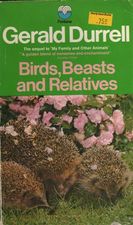 Title: Birds, Beasts and Relatives
Title: Birds, Beasts and Relatives
Author: Gerald Durrell
Published: Fontana, 1971, pp. 220
Genre: Autobiographical wildlife fiction
Blurb: All Gerald Durrell’s books are extremely enjoyable. My Family and Other Animals is the best, spun from his family’s five-year sojourn, before thewar, when he was in his early teens on Corfu. In Birds, Beasts and Relatives, returning to the same place, he has done it again… He effortlessly immerses us in the glittering bays and sun-shined olive groves, teeming with weird astonishments.
Where, when and why: This book was another find from the Winchester Cathedral book stall earlier this month. I picked it up because I recently read Gerald Durrell’s A Zoo in My Luggage and it reminded me how much I enjoy his writing. Talking about him when reviewing Miss Pettigrew Lives for a Day made me decide to reach for this book now.
What I thought: There are few writers who are as skilled at relating an anecdote as Gerald Durrell. His writing has a way of capturing the people, animals and situations that he encounters perfectly; reading this book was almost as good as being in Corfu with Durrell and his madcap family. Reading about the family again was a welcome return after their absense in A Zoo in My Luggage. As the people that Gerals Durrell knows best, they all have well-developed and entertaining personae within the book and are funny and embarrassing in the way that only family can be. Seeing them again was a bit like revisiting old friends and I thoroughly enjoyed laughing with them at their own follies.
As always with Gerald Durrell’s writing, the book was a careful balance of human drama and encounters with local wildlife, containing just enough detail to be interesting without being too scientific. These books are, after all, primarily fun. However, as excellent as Durrell’s grasp of the anecdote is, they aren’t very well strung together in this book. As it contains stories which were left out of My Family and Other Animals rather than being a continuation of the novel, there are large time gaps between the events which are related and they are presented in a random order without any thematic or chronological links. I still enjoyed this book and I would recommend it to anyone else, but I would have preferred the book to have a bit more structure.
Where this book goes: This book joins my other Gerald Durrells on my shelves as they are all perfect quick, light reads for bad days.
Tea talk: This book was accompanied by honeybush tea from Whittards. I don’t put sugar or milk in my tea, so I tend to favour leaves or blends which are naturally sweet and this one did not disappoint. Definitely a good tea to perk me up on a chilly, rainy summer day.
Review: ‘Miss Pettigrew Lives for a Day’ by Winifred Watson
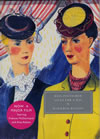 Title: Miss Pettigrew Lives for a Day
Title: Miss Pettigrew Lives for a Day
Author: Winifred Watson
Published: Persephone Books, 2008, pp. 234
Genre: Early twentieth century fiction
Blurb: Miss Pettigrew is a down-on-her-luck, middle-aged governess sent by her employment agency to work for a nightclub singer rather than a household of unruly children. Over a period of 24 hours her life is changed — forever.
Where, when and why: I bought this book from a second hand book stall outside Winchester Cathedral earlier in the month. I saw first saw it in Waterstones sometime last year and have been wanting to read it ever since, so I was very pleased when I found this copy and started reading it as soon as I had finished my previous book.
What I thought: Happy books seem to be decidedly unfashionable. I cannot remember the last time I read a book that wasn’t written by Gerald Durrell which didn’t feature terrible, tear-jerking adversity to be overcome, moments of heartfelt misery, or at the very least self-indulgent angst. None of these are bad things per se, but it is nice to have a change sometimes if only to provide some much-needed contrast. Miss Pettigrew Lives for a Day is just such a breath of literary fresh air; it is a very happy book indeed. Reading it is like curling up in a comfortable chair with a pot of tea, a box of chocolates and a cat purring on your lap (which, incidentally, is exactly how I read this book). It is warm, comforting and just makes you smile.
The Cinderella story of Miss Pettigrew is absolutely delightful to read as Winifred Watson handles it so well. The tale of the eponymous heroine, a middle aged spinster who is treated to an experience of how the other half live when she is accidentally sent to apply for a job at the wrong address and is then adopted by beautiful nightclub singer Miss LaFosse, could easily have been sickly sweet and sentimental. Equally, the storyline lends itself to cruel humour at the expense of Miss Pettigrew or the wealthy people among whom she finds herself, but Watson deftly avoids becoming either saccharine or satirical. This book is entirely without malice, and yet it is full of social humour which reminded me at times of Jane Austen and Oscar Wilde, although Winifred Watson’s style is very different.
The characters in the book are enjoyable and likeable: the sort of characters who make you hope that everything will work out for them. Miss LaFosse is endearingly naive for all her worldly ways, and is full of warmth and understanding. Miss Dubarry is hardened and insightful but also vulnerable and emotional. The cast of accompanying men are equally amusing, and they are all believable though none are particularly complex characters. It is impossible not to warm to Miss Pettigrew herself as she is alternately shocked and delighted by the new, permissive world she discovers. It is highly entertaining to watch her adapt to her surroundings and the people around her adapt to Miss Pettigrew’s own particular character. Coming from her mouth, Winifred Watson puts more meaning in the single word “quite” than many authors do in whole paragraphs of dialogue.
Dialogue is a paticular strength of this novel. In fact, a lot of it is written entirely in direct speech. This works extremely well in the scene at the party where this dialogue is all without a designated speaker, as it is as though the reader can overhear other people’s conversations without knowing who exactly it speaking, just like being at a busy party. It gives the book the lively, sparkling feel of a Fred Astaire film and I loved every minute of it.
I can’t talk about this book without mentioning the gorgeous edition in which I read it. Number 21 in the Persephone Classics range, this book was as much of a pleasure to look at as it was to read. It featured the original drawings from the 1938 publication of the book, some of which were lovely and really helped to give a feel of the time and place of the novel, and others of which were not as successful. The pictures of Miss LaFosse in her negligee, for example, do make her look rather like a crocodile standing on its hind legs. Nonetheless, I was glad that they were included and I’ll definitely be buying more books from this publisher.
Where this book goes: This book is staying very firmly on my shelves. It’s a lovely story and the perfect antidote to a rainy day or a bad mood. Everyone should own this book for just such occasions.
Tea talk: While reading this book, I was drinking Regent’s Park tea from the wonderful Yumchaa in Soho. It’s a blend of green tea with pieces of papaya and pineapple, strawberries, raspberries and rose petals and may well be my new favourite tea. Its taste is light and sweet and the fragrance is divine. Go and try some.
Review: ‘The Stone Book Quartet’ by Alan Garner
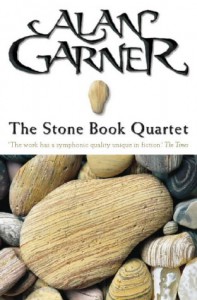 The four books which make up this volume were first published individually. “As the stories grow into one story, so one’s awareness of the emblems and symbols deepens! Garner binds the reader to him and he shows us the author working with language to make his book as his characters worked with stone and iron. Not a word is wasted.” – “Times Literary Supplement”. “The Stone Book” – “Expect a lot and you won’t be expecting too much of “The Stone Book”. It is a miniature masterpiece and, like all great miniatures, is staggering in what its limits contain.” – Signal. “Granny Reardun” – “A brief, distinguished, satisfying book.” – “The Observer”. “The Aimer Gate” – “”The Aimer Gate” and its companion books deserve to last as classics in their kind – compact, concentrated, yet giving that impression of ease and simplicity which is the mark of a craftsman.” – “The Sunday Times”. “Tom Fobble’s Day” – “The writing is marvellously precise, metaphorical and compressed, using each word to do the power of ten.” – “The Guardian”. (Goodreads Summary)
The four books which make up this volume were first published individually. “As the stories grow into one story, so one’s awareness of the emblems and symbols deepens! Garner binds the reader to him and he shows us the author working with language to make his book as his characters worked with stone and iron. Not a word is wasted.” – “Times Literary Supplement”. “The Stone Book” – “Expect a lot and you won’t be expecting too much of “The Stone Book”. It is a miniature masterpiece and, like all great miniatures, is staggering in what its limits contain.” – Signal. “Granny Reardun” – “A brief, distinguished, satisfying book.” – “The Observer”. “The Aimer Gate” – “”The Aimer Gate” and its companion books deserve to last as classics in their kind – compact, concentrated, yet giving that impression of ease and simplicity which is the mark of a craftsman.” – “The Sunday Times”. “Tom Fobble’s Day” – “The writing is marvellously precise, metaphorical and compressed, using each word to do the power of ten.” – “The Guardian”. (Goodreads Summary)
When I was younger, I loved the Alan Garner books I read because of their exciting stories, fantasy characters and mythic themes, all of which attributes are completely absent from ‘The Stone Book Quartet’. Instead, this book tells a simple, quiet story through four vignettes of four generations of a family living in a village outside Manchester and their interactions with the land. While I’m very glad I didn’t pick this book up aged nine when I read the rest of his books as I suspect I would have been disappointed at how different it was, it has a beauty and a magic all of its own.
The way that Alan Garner handles time in this book is impressive: he manages to convey a the development and modernisation as the four stories progress, whilst simultaneously giving an impression of timelessness to the characters and their surroundings. There is a sense of sadness as the outside world changes and the characters must change with it, but the fundamentals of craftmanship, respect for the land and family relationships remain constant. Place is also very important in the book, and is conveyed effortlessly through the use of local dialect words, which felt natural rather than forced and self-conscious.
I do think that the book could have benefitted from a glossary explaining some of these local terms, but on the whole they didn’t interrupt my enjoyment of the story. Similarly, I sometimes felt that there were passages I couldn’t fully appreciate because I know nothing about smithing or stone cutting, but at the same time, any explanation in the text would have been out of place and would have spoilt the tone of the simple, direct narrative.
The Stone Book Quartet by Alan Garner. Published by Flamingo, 1999, pp. 172. Originally published in 1976.
N.B. This is an old review written in 2010 and posted on Goodreads and LibraryThing before I started keeping track of all the books I read here at Old English Rose Reads. I’ve decided to keep copies here so that this remains a complete record of my reading since I started reviewing books for my own pleasure.


